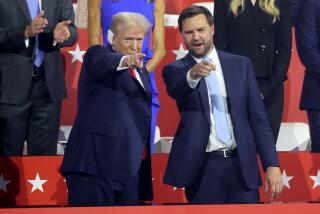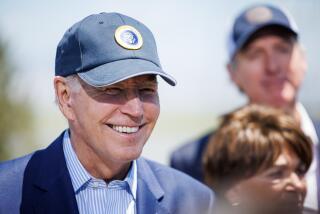Bush May Be Tonic the GOP Needs
- Share via
GREENSBORO, N.C. — As Texas Gov. George W. Bush strode into the Hilton Hotel’s grand ballroom here--with his wife, Laura, on his arm and wearing a gray suit and a confident grin--the whoops and hollers made it clear that for the 500 Republicans at the recent luncheon, an extraordinary presence had arrived.
“Doesn’t he look just like his dad?” cooed one of the guests at the GOP fund-raiser.
True enough, the eldest son of the 41st president does resemble his father. But Gov. Bush’s face is craggier, his hair curlier, his manner jauntier than ex-President Bush’s. And at age 52, the younger Bush finally has achieved the status he has sought most of his life: He is his own man.
More than that, he has become a hot new political property. With the GOP nursing its wounds from two consecutive White House losses and no other Republican of much distinction being mentioned for the 2000 contest, Bush has emerged as the early front-runner for his party’s presidential nomination.
The buzz around Bush has been growing steadily, spurred by three well-respected national polls in recent months that have showed him defeating Vice President Al Gore, the presumed Democratic nominee, in a hypothetical matchup. Attesting to Bush’s status is the demand for his fund-raising services--”We get 20 to 30 requests a week,” said Karl Rove, the governor’s chief strategist.
But for the time being, Bush’s eyes are upon Texas and his reelection campaign, in which several polls show him light years ahead of his Democratic challenger, state Land Commissioner Garry Mauro.
As for the presidency, in public, Bush is cheerfully noncommittal. “If I run, I want your help,” he told the Greensboro audience. “If I don’t run, I’m glad to be here anyway.”
Nevertheless, Bush privately acknowledges he might not have much choice about running, given the momentum building behind his candidacy. “I feel like a cork on the river,” he told one longtime confidant, who in turn predicted: “The tide is going to pull him very strongly into running for president.”
Bush’s standing is based on more than his strong showing against Gore in the recent surveys, which even his backers admit is based in part on mere name recognition. Counted as solid assets are his position as the popular governor of the nation’s second-most-populous state and the relative ease with which it appears that he--almost alone among his potential GOP rivals--could raise the more than $20 million needed for a run at the presidency.
Additionally, while Gov. Bush is no more a spellbinder than was President Bush, the son’s direct, folksy style creates an impression of authority and sincerity the father rarely achieved.
As a bonus, another of the Bush boys, Jeb, is the current favorite to win Florida’s governorship in November. That would give him a potent perch from which to help his brother in 2000.
Higher Goal Seems to Be on His Mind
Still, it’s very early in the presidential game. Although George W. Bush was involved in his father’s White House campaigns in 1988 and 1992, he has never sought national office himself. Under the intense scrutiny of such a contest, he could turn out to have the political equivalent of a glass jaw, much like another heralded Republican governor of 30 years ago, Michigan’s George Romney. And Bush could soon fall victim to the expectations game: Should his anticipated big victory fail to help the GOP candidate for lieutenant governor also win office, that will be interpreted as a sign of weakness.
As he seeks reelection, Bush clearly has his sights on a higher goal, trying out a message that transcends the concerns of the Lone Star State. In the process, he is grappling with the fundamental challenge facing whomever the GOP’s next nominee will be--knitting together the raveled, often contentious strands of post-Reagan Republicanism into an electoral majority.
Bush’s theme, on display as he stumped across sun-scorched Texas earlier this month, plays off the reputed character weaknesses of President Clinton and, more generally, the baby boomer excesses spawned by the 1960s. As Bush presses the flesh, signs autographs and poses for photographs--all of which he carries off with the gusto of a natural politician--in his speeches he sounds a sober call for a new and more disciplined model of behavior.
His reelection, Bush promised admiring crowds in South Texas, would be the harbinger of nothing less than a fundamental shift in American culture to what he labeled “the responsibility era.”
“I’m worried about a culture that says, ‘If it feels good, do it; if you’ve got a problem, just go ahead and blame somebody else,’ ” Bush declared. “I see a more compassionate day, a more decent day, which says that each and every one of us are responsible for the decisions we make in life and each of us are responsible for loving our neighbor as we’d like to be loved ourselves.”
Alluding to the 1960s, Bush said: “I have seen a culture change once in my lifetime, so I am an optimistic fellow. I know it can change again.”
Bush backers concede this message needs to be fleshed out. But they claim the theme has the potential to appeal not only to social conservatives, who furnish the GOP with much of its ideological energy, but to more pragmatic middle-class suburbanites, particularly to the baby boomers among them.
Although he does not mention Clinton on the stump, in an interview, Bush depicted himself as a figure who, like the president, has been guilty of self-indulgence. But, in what he offers as a contrast with Clinton, Bush says he learned from his mistakes and thus can appeal to the pride of their fellow baby boomers. Despite the president’s high standing in the polls, Bush said: “People are concerned about Clinton’s behavior because it undermines the idea of personal responsibility. We’ve got to get this chapter in American history behind us and move on.”
Not a Holy Man, Just a Realistic One
Bush, by most accounts, was something of a hellion as a young man--as an undergraduate at Yale University, a graduate student in business administration at Harvard University and an oilman in Midland, Texas. “George had a good time, and there were a lot of gin and tonics and . . . a lot of wise-guy remarks,” said his cousin, John Ellis, a Boston marketing consultant who shared in many of those moments.
But Bush’s mores and lifestyle have changed. On his 40th birthday, with some prompting from his wife, friends say, Bush decided alcohol was “interfering with my energy level,” as he recently put it, and quit drinking, cold turkey.
“I made a lot of mistakes when I was young, and I learned from my mistakes,” Bush said. “I’ve asked people to adhere to a higher standard than I did. I’m not trying to be holier than thou. I’m trying to be realistic.”
Bush claims his views on such cultural issues are based on conviction, not political calculation. Whatever the motivation, his sermonizing helps him with the social conservative wing of the GOP. At the same time, he is deemed acceptable by moderate Republicans, because he generally avoids the harsh moralistic rhetoric of some other party leaders.
For instance, in contrast to Senate Majority Leader Trent Lott of Mississippi, who recently branded homosexuality a sin, Bush said: “The truth of the matter is, that when it comes to sin, we’re all sinners, and the degree of sin ought to be left to the almighty.”
Asked about the theory that Lott is striving to energize the GOP’s conservative base with such comments, Bush said: “I think there is a better way of handling the issue. I don’t think you can lead by dividing. I think you lead by uniting.”
Also reinforcing the perception of Bush as a moderate is his qualified support for bilingual education, a position flying in the face of the recent passage of Proposition 227 in California to end its use in state schools. “My deal on bilingual education is that if it works, if it teaches children, we ought to support the program,” said Bush, who hopes to expand his support among Texas’ large Latino population this fall.
Again in contrast to many other Republicans, Bush has adopted a more welcoming attitude toward immigrants. He won much attention when he resisted pressure to back measures such as California’s Proposition 187, which denies an array of public services to illegal immigrants.
“Hispanics feel there is a kind of ‘us versus them’ mentality,” he said. “I think my responsibility is to say to them, ‘You’re part of the future of this state; we want you to be part of the future of this state.’ ”
Finding Victory in Defeat
Looking ahead, Bush stresses that whether he seeks the presidency is a decision yet to be made, not one shaped by his heritage or any long-held ambition. “I didn’t in the eighth grade say, ‘I am going to run for student council, because this is the beginning of my chance to be president,’ ” he says.
Still, like most sons of famous men, Bush was shadowed by the towering presence of his father as he struggled to work out his own identity.
With the end of the elder Bush’s political career, that tension has eased, friends say. “He was really liberated by his father’s defeat in 1992,” said Ellis, his cousin.
More to Read
Get the L.A. Times Politics newsletter
Deeply reported insights into legislation, politics and policy from Sacramento, Washington and beyond. In your inbox twice per week.
You may occasionally receive promotional content from the Los Angeles Times.










